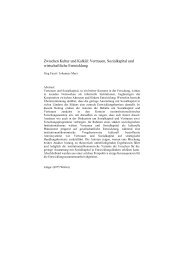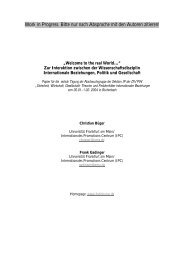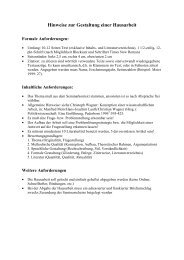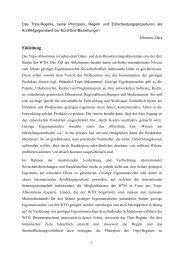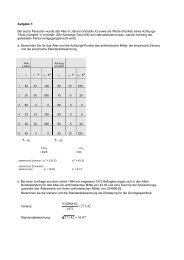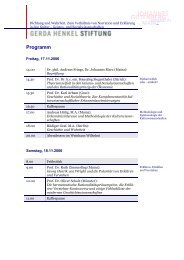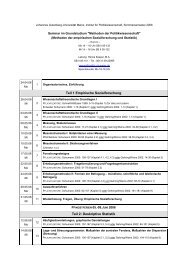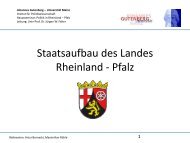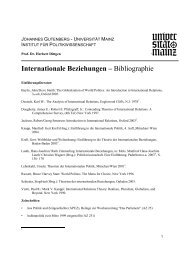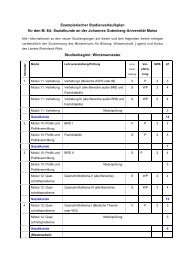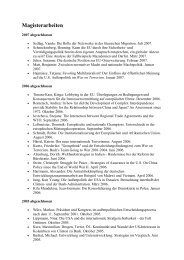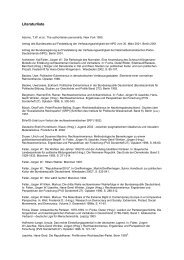Feedback Effects in Foreign Policy: A Framework for Analysis
Feedback Effects in Foreign Policy: A Framework for Analysis
Feedback Effects in Foreign Policy: A Framework for Analysis
You also want an ePaper? Increase the reach of your titles
YUMPU automatically turns print PDFs into web optimized ePapers that Google loves.
32<br />
explanation factors. The start<strong>in</strong>g po<strong>in</strong>t of research does not matter: you can beg<strong>in</strong> with the<br />
agency-level and then reconstruct the effects of <strong>for</strong>eign policy on the <strong>in</strong>ternational context<br />
and back aga<strong>in</strong>, or go the other way and start with the effects from the <strong>in</strong>ternational<br />
environment on state decisions.<br />
Such a perspective may also serve to heed the discipl<strong>in</strong>ary calls <strong>for</strong> analyz<strong>in</strong>g the<br />
“unloved” empirical phenomenon of <strong>for</strong>eign policy change <strong>in</strong> long-term dynamics. The<br />
heuristic firstly serves as an analytical guidance to sensitize the researcher to the possible<br />
constra<strong>in</strong><strong>in</strong>g elements on the <strong>in</strong>ternational level and on the level of decision mak<strong>in</strong>g.<br />
Secondly, through our review of different theoretical research strands <strong>in</strong> IR, FPA and policy<br />
analysis, researchers are <strong>in</strong>vited to use the potentially fruitful accounts we identified. Of<br />
course, such a theoretical repertoire is potentially open-ended. The recent range of<br />
theoretical approaches can be divided, roughly spoken, <strong>in</strong> rationalist-<strong>in</strong>stitutionalist and<br />
constructivist-sociological accounts on both level of analysis. Thus, depend<strong>in</strong>g on the<br />
theoretical aff<strong>in</strong>ity of the researcher, the reconstruction of a feedback loop has either a more<br />
rationalist or a more constructivist bend. There exist many potential empirical cases <strong>for</strong><br />
such an analysis: the constra<strong>in</strong><strong>in</strong>g effects of the WTO on develop<strong>in</strong>g countries, the complex<br />
relationship between Turkey and the European Union, the impact of US Lat<strong>in</strong> America<br />
policy on the rise of populist regimes there etc.<br />
Our own goal with the heuristic, which itself is still work <strong>in</strong> progress, is to study U.S.<br />
<strong>for</strong>eign policy after 9-11. Apply<strong>in</strong>g the heuristic, we <strong>in</strong>tend to elaborate the feedback loop <strong>in</strong><br />
three major steps: first, we start with the decision of the Bush adm<strong>in</strong>istration to beg<strong>in</strong> a<br />
“global war aga<strong>in</strong>st terrorism” after 9-11, beg<strong>in</strong>n<strong>in</strong>g <strong>in</strong> Afghanistan. We would take a closer<br />
look on this period of time to grasp possible domestic constra<strong>in</strong>ts dur<strong>in</strong>g the<br />
implementation process which caused <strong>in</strong>ternal (establish<strong>in</strong>g Homeland Security politics) as<br />
well as external (new alliance build<strong>in</strong>g: coalition of the will<strong>in</strong>g) effects. The second research<br />
step focuses on the new <strong>for</strong>mation of the <strong>in</strong>ternational environment over the years of the<br />
wars <strong>in</strong> Afghanistan and Iraq. Then, the changes with<strong>in</strong> the three dimensions of the<br />
<strong>in</strong>ternational environment are at the centre of analysis: 1) <strong>in</strong> the <strong>in</strong>stitutional context there<br />
are changes and disagreements <strong>in</strong> the transatlantic relationship <strong>in</strong> material questions<br />
(alliances) as well as normative dimensions (legitimacy of U.S. hegemony); 2) the<br />
distribution of power and wealth po<strong>in</strong>ts us the relative power position of the U.S. <strong>in</strong> the<br />
<strong>in</strong>ternational system which is either characterized as a new empire, or as a decl<strong>in</strong><strong>in</strong>g<br />
hegemony with overstretch<strong>in</strong>g ambitions (Iraq) which decl<strong>in</strong>es <strong>in</strong> power position relative to<br />
ris<strong>in</strong>g rivals as Ch<strong>in</strong>a; and 3) a look at the policies of other actors (states) highlights the<br />
chang<strong>in</strong>g bilateral relations between the U.S. with old allies (Brita<strong>in</strong>, Germany), ambivalent



